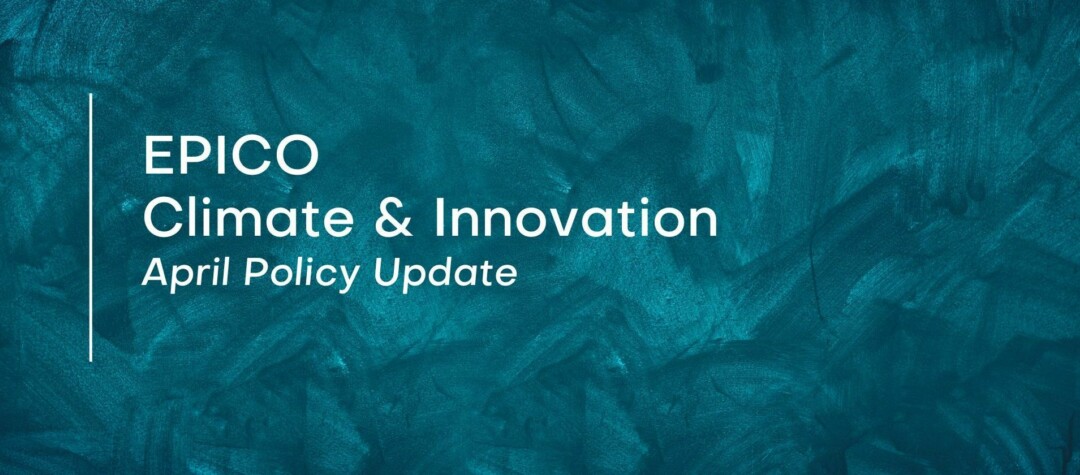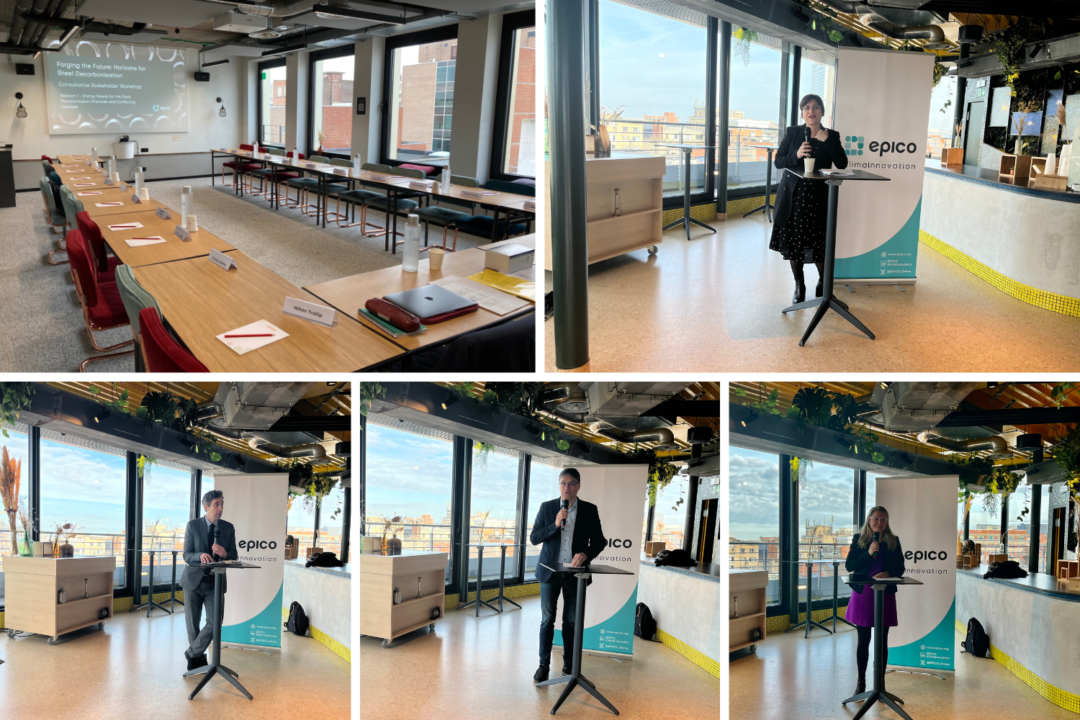
Forging a new industrial agenda: NZIA anniversary, decarbonising steel, and offshore opportunities
EPICO KlimaInnovation is a non-profit and independent energy and climate policy think tank providing a platform and network for policy development. In our Monthly Policy Update, we dive into the latest and most relevant developments in energy and climate policy and share the outcomes of our events and publications.
One-year of NZIA: What lies ahead for Europe’s industrial base?
March marked the one-year anniversary of the Net-Zero Industry Act (NZIA). Conceived as a response to the US Inflation Reduction Act (IRA), the NZIA aims to bring strategic cleantech manufacturing back to the bloc. By setting the ambitious target of producing 40% of net-zero technologies in the EU by 2040, the Act endeavours to simplify permitting procedures and bolster strategic cleantech projects.
The European Parliament is expected to give final approval to the NZIA at the beginning of April. Against this backdrop, EPICO and the Energy Resilience Leadership Group (ERLG) have presented a policy paper on setting “A New Industrial Agenda to Increase Germany’s Resilience”. The paper calls for a more strategic industrial framework for innovation, which enables transformation and the development of new technologies.
To accelerate the adoption of cleantech and facilitate innovation in an ever more competitive global environment, the paper puts forward five key recommendations:
- Future-proofing the electricity market by optimising financing for renewable assets, incentivising flexibility and innovation in industrial power demand and establishing technology-neutral, market-oriented capacity mechanisms.
- Leveraging regulatory sandboxes to foster innovation while ensuring safety and environmental protection.
- Increasing financial and tax incentives as an alternative to subsidies.
- Boosting grants and public procurements as another alternative to permanent subsidies to increase the bankability of smaller companies, market entry, and manufacturing of cleantech solutions.
- Embarking on a new integrated approach to energy resilience, favouring European programmes that promote and implement innovation within ecosystems.
These suggestions stem from discussions held during EPICO and ERLG’s Policy Accelerator, hosted by Siemens Energy between 9 and 12 January 2024. EPICO’s CEO Bernd Weber had the opportunity to present these recommendations at the Munich Security Conference in February 2024. Read our summary in our March Update.
STAY TUNED! The full version of the paper will be published next week. Can’t wait? Download the teaser here.
Forging the future: Next steps in steel decarbonisation
While the NZIA is a significant step towards the rapid and competitive development of net-zero technologies, the transformation of energy-intensive sectors should also be on policymakers’ minds. Steel, cement, and chemical industries are essential to Europe’s economy and will play a vital role in the transition towards less carbon-intensive societies. Yet, the decarbonisation of these sectors requires a comprehensive policy framework.
To advance the policy debate on the topic, EPICO organised a consultative workshop on 19 – 20 March 2024, in Brussels. The event, a new format for EPICO, brought together experts from EU institutions, industry, business associations, NGOs, think tanks, and academia. High-level keynote speakers, such as Henrike Hahn MEP, Peter Liese MEP, Ruud Kempener (DG ENER), and Gokce Mete (Vattenfall), offered inspiring insights that set the tone for the discussions.
The workshop featured four sessions, each introduced by experts on areas crucial for the transition to low-carbon steel. Topics spanned from the transformation of the steel sector to renewables, hydrogen, and a socially just transition, with contributions from Joana Fonseca (Hydrogen Europe), Ysanne Choksey (E3G), Federico Donà (European Steel Association), and Frank Düssler (Georgsmarienhütte).
Another session addressed creating demand for green steel through lead markets and green public procurement, featuring insights from Eileen Torres Morales (Stockholm Environment Institute), Christophe Yvetot (UNIDO), and Gerhard Endemann (Wirtschaftsvereinigung Stahl).
The topics of circular economy and material efficiency were explored by Daniel Pietikäinen (BRI), Fausto Zaccaro (Sandbag), and Joren Verschaeve (Environmental Coalition on Standards), while a discussion on the international dimension of steel decarbonisation was kickstarted by Åsa Ekdahl (World Steel Association), Lidia Tamellini (Carbon Market Watch), Sebastian Oberthür (VUB), and Hilton Trollip (University of Cape Town).

The workshop underscored the importance of collaboration across the value chain to drive the steel industry towards a low-carbon future. It highlighted the need for policies that support the transition, and stressed the role of energy and materials, market development, and the creation of a strong business case for low-carbon steel.
Here is EPICO’s EU Policy Specialist Julian Parodi’s key takeaway:
The event was a step forward in addressing the many questions laying ahead for steel decarbonisation. In particular, it shed light on the crucial topics of supporting first end users of green steel and maximising the potential of steel scrap.
The results of these discussions will inform a Policy Paper, which will be published during the summer.
DON'T MISS IT! Register for our mailing list here.
Decarbonising Germany’s steel sector
Steel decarbonisation needs to be high on national agendas too. An active player in European and international initiatives, the German steel industry is crucial to Europe’s overall decarbonisation and transformation. The sector not only is a central pillar of the German economy, but it also produces more than a quarter of the EU’s steel.
While the German steel industry has made strides in adopting new technologies and policy instruments supporting its decarbonisation are already being rolled out, more needs to be done to make sure the transformation is uniform and reduce dependencies on external markets.
Against this backdrop, on 25 April, EPICO will organise a second workshop on steel decarbonisation, this time in Berlin. A group of hand-picked actors from business, science and civil society will have the opportunity to discuss two main fields of actions in steel transformation: lead markets and public procurement, and circular economy and material efficiency.
What insights can we anticipate from this workshop? We asked EPICO’s Senior Policy Specialist Joachim Schmitz-Brieber:
Long-term pull-elements, such as lead markets, will have to carry the main burden of transforming the steel sector. I am looking forward to hearing our participants’ views on the best way forward.
A new energy era: Exiting the ECT and seizing offshore opportunities
On 6 March, EU member states representatives agreed on a collective withdrawal from the controversial Energy Charter Treaty (ECT). The Treaty, launched in the 1990s to support energy investments of former Eastern bloc countries, had become a criticised tool used by fossil energy companies to defend their businesses in the face of EU climate action legislation. The European Parliament is expected to agree on the withdrawal in April 2024.
The decision to leave the Treaty came soon after the UK announced its exit on 22 February. Calling the Treaty “outdated and in need of reforms”, the UK aims to redirect its focus on boosting domestic energy production and increasing investment in renewables, particularly in the North Sea. Aiming to become a “global pioneer” in wind power, the UK government has earmarked £800 million for offshore wind development.
The North Sea can also play a vital role in the future of the EU’s energy security and industrial policy. Offshore renewable energy can be converted into hydrogen which can significantly ease the decarbonisation of hard-to-abate sectors, such as the steel industry. The EU has already achieved a record by installing 3.8 GW of offshore wind last year, but more investment and cooperation between member states are needed.
To delve into the complexities and opportunities of offshore production in the North Sea, EPICO will host an in-person discussion on 18 April, taking place at the UK Ambassador’s Residence in Brussels. Experts participating in the discussion include EPICO’s CEO Bernd Weber, Jorgo Chatzimarkakis (CEO, Hydrogen Europe), Christoph von dem Bussche (Managing Director, Gascade), Mechthild Wörsdörfer (Deputy Director General at DG ENER), and representatives from the UK Mission. The dialogue will be moderated by Alice Hancock, Climate and Energy Reporter at the Financial Times.

Here’s what EPICO’s CEO Bernd Weber say about the event:
The North Sea holds an enormous potential to contribute to energy security and sustainability. As offshore wind capacity expands rapidly, the region is primed to become a major hub for green hydrogen production in Europe. But to unlock this potential, we need more than just declarations. I look forward to discussing how to accelerate infrastructure integration in the North Sea.
INTERESTED? Find out more and register here.
